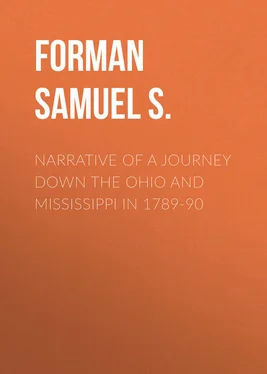Samuel Forman - Narrative of a Journey Down the Ohio and Mississippi in 1789-90
Здесь есть возможность читать онлайн «Samuel Forman - Narrative of a Journey Down the Ohio and Mississippi in 1789-90» — ознакомительный отрывок электронной книги совершенно бесплатно, а после прочтения отрывка купить полную версию. В некоторых случаях можно слушать аудио, скачать через торрент в формате fb2 и присутствует краткое содержание. Жанр: foreign_antique, foreign_prose, на английском языке. Описание произведения, (предисловие) а так же отзывы посетителей доступны на портале библиотеки ЛибКат.
- Название:Narrative of a Journey Down the Ohio and Mississippi in 1789-90
- Автор:
- Жанр:
- Год:неизвестен
- ISBN:нет данных
- Рейтинг книги:5 / 5. Голосов: 1
-
Избранное:Добавить в избранное
- Отзывы:
-
Ваша оценка:
- 100
- 1
- 2
- 3
- 4
- 5
Narrative of a Journey Down the Ohio and Mississippi in 1789-90: краткое содержание, описание и аннотация
Предлагаем к чтению аннотацию, описание, краткое содержание или предисловие (зависит от того, что написал сам автор книги «Narrative of a Journey Down the Ohio and Mississippi in 1789-90»). Если вы не нашли необходимую информацию о книге — напишите в комментариях, мы постараемся отыскать её.
Narrative of a Journey Down the Ohio and Mississippi in 1789-90 — читать онлайн ознакомительный отрывок
Ниже представлен текст книги, разбитый по страницам. Система сохранения места последней прочитанной страницы, позволяет с удобством читать онлайн бесплатно книгу «Narrative of a Journey Down the Ohio and Mississippi in 1789-90», без необходимости каждый раз заново искать на чём Вы остановились. Поставьте закладку, и сможете в любой момент перейти на страницу, на которой закончили чтение.
Интервал:
Закладка:
Denise Forman’s next move was to enlist with Captain Philip Freneau, the well-known poet, who sailed from Philadelphia in a letter of marque, the Aurora , against British commerce on the high seas. While not long out, sailing toward the West Indies, Freneau and his adventurous vessel were captured by their enemies, sent to New York, and all incarcerated on board of the Scorpion , one of the prison ships floating in New York harbor and Wallabout Bay, its unhappy prisoners experiencing almost untold horrors. Captain Freneau, at least, was subsequently transferred to what he denominated “the loathesome Hunter .” These prison ships attained an unenviable reputation for maltreating and half-starving their hapless and ill-fated victims, hundreds of whom died in consequence of their inhuman treatment. This sad experience became the subject of one of Freneau’s subsequent poems, emanating from the depths of his embittered soul recollections. Brother Denise used to relate to me, after his return home, that, when on the prison ship, he had to shut his eyes whenever he ate the sea-biscuit or drank the water assigned him, so full were they of vermin! Freneau, in his poem, thus alludes to the fare with which the poor prisoners were treated:
“See, captain, see! what rotten bones we pick.
What kills the healthy can not cure the sick.
Not dogs on such by Christian men are fed;
And see, good master, see that lousy bread!”
“Your meat or bread,” this man of flint replied,
“Is not my care to manage or provide;
But this, damn’d rebel dogs, I’d have you know,
That better than you merit we bestow.
Out of my sight!” No more he deigned to say,
But whisk’d about, and, frowning, strode away.
When the survivors were exchanged, after their long imprisonment, they were so weak and emaciated that they could scarcely walk – perfect living skeletons; and my brother, after his return home, was confined to his bed, and for several days nearly all hope of his recovery was abandoned; but he at length providentially recovered. Denise Forman received a captain’s commission when a war was threatened with France, in 1798, and when the army was disbanded, he settled on a farm in Freehold, where he spent the remainder of his days.
About 1790, Captain Freneau married my sister Eleanor. He was a prominent Anti-Federalist in his day, and edited various Democratic papers at different places, and was for a time translating clerk in the State Department. While he was able to translate the French documents, he found it cost him more than he received to get those in other foreign languages properly translated, and after a while he resigned. He had in early life been a college-mate with James Madison, at Princeton, and has been aptly called the “patriot poet” of the Revolution, his effusions having been useful to the cause of the country during its great struggle for independence. He lost his life in a violent snow-storm, in December, 1832, in his eighty-first year, near Monmouth, New Jersey.
While attending grammar-school, the latter part of the Revolutionary war, at Freehold, young Forman records: The hottest part of the battle of Monmouth was about this spot, where my brother-in-law, Major Burrows, lived after he left the army, and with whom I and some fellow-students boarded. Our path to the school-house crossed a grave where a remarkably tall British officer was buried. We opened the grave; a few pieces only of blanket, which encompassed the corpse, remained. One school-mate, Barnes Smock, was a very tall person, but the thigh bones of this unfortunate officer far outmeasured his. I believe this was the only engagement when the two opposing armies had recourse to the bayonet, 3 3 This is an error. Bayonet charges were resorted to by Morgan at the Cowpens, and in other engagements.
and this was the place of that charge. The battle took place on the Sabbath. A British cannon ball went through Rev. Dr. Woodhull’s church. Dr. Woodhull was now one of my teachers. The two armies lay upon their arms all night after the battle. General Washington and General La Fayette slept in their cloaks under an apple-tree in Mr. Henry Perrine’s orchard. It was Washington’s intention to have renewed the battle the next day, but the British, in the course of the night, stole a march as fast as they could for their fleet at Sandy Hook.
In the spring of 1783, when peace was dawning, many of the old citizens of New York City, who had been exiled from their homes for some seven years, began to return to their abandoned domiciles, even before the British evacuation. Among them was Major Benjamin Ledyard, who had married my oldest sister. In September of that year, at the instance of my sister Ledyard, I went to New York as a member of her family. Every day I saw the British soldiers. Indeed, a young lieutenant boarded a short time in our family, as many families received the British officers as an act of courtesy.
Even before the British evacuation, the American officers were permitted to cross over into the city, and frequently came, visiting the coffee-houses and other places of public resort. Here they would meet British officers, and some of them evinced a strong inclination to make disturbance with their late competitors, throwing out hints or casting reflections well calculated to provoke personal combats. There was a Captain Stakes, of the American Light Dragoons, a fine, large, well-built man, who had no fear about him. It was said, when he entered the coffee-house, that the British officers exercised a wholesome caution how they treated him, after some of them had made a feint in testing his powers. But it all happily passed over without harm.
It was finally agreed between General Washington and Sir Guy Carleton that New York should be evacuated November 25th. In the morning of that day, the British army paraded in the Bowery. The Americans also paraded, and marched down till they came very close to each other, so that the officers of both armies held friendly parleys. The streets were crowded with people on an occasion so interesting. I hurried by the redcoats till I reached the Americans, where I knew I would be safe. So I sauntered about among the officer. Presently, an American officer seized me by the hand, when, I looking up at him, he said, encouragingly: “Don’t be afraid, Sammy. I know your brother Jonathan. He is an officer in the same line with me, and my name is Cumming.” 4 4 This was John N. Cumming, who rose from a lieutenant to be lieutenant-colonel, commanding the Third New Jersey Regiment, serving the entire war.
He continued to hold me by the hand till orders were given to advance. He advised me to keep on the sidewalk, as I might get run over in the street.
The British steadily marched in the direction of their vessels, while the Americans advanced down Queen (since Pearl) street; the British embarking on board their fleet on East river, I believe, near Whitehall, and the Americans headed directly to Fort George, on the point where the Battery now is. Stockades were around the fort, and the large gate was opened. When the British evacuated the fort, they unreefed the halyards of the tall flag-staff, greased the pole, so that it was some time before the American flag was hoisted. At length, a young soldier 5 5 The editor, while at Saratoga Springs, in 1838, took occasion to visit the venerable Anthony Glean, who resided in the town of Saratoga, and who was reputed to be the person who climbed the greased flag-staff at the evacuation of New York, and who himself claimed to have performed that feat. He was then a well-to-do farmer, enjoying a pension for his revolutionary services, and lived two or three years later, till he had reached the age of well-nigh ninety. The newspapers of that period often referred to him as the hero of the flag-staff exploit, and no one called it in question.
succeeded in climbing the pole, properly arranged the halyards, when up ran the striped and star-spangled banner, amid the deafening shouts of the multitude, that seemed to shake the city. It is easier to imagine than to describe the rejoicing, and the brilliancy of the fireworks that evening.
Интервал:
Закладка:
Похожие книги на «Narrative of a Journey Down the Ohio and Mississippi in 1789-90»
Представляем Вашему вниманию похожие книги на «Narrative of a Journey Down the Ohio and Mississippi in 1789-90» списком для выбора. Мы отобрали схожую по названию и смыслу литературу в надежде предоставить читателям больше вариантов отыскать новые, интересные, ещё непрочитанные произведения.
Обсуждение, отзывы о книге «Narrative of a Journey Down the Ohio and Mississippi in 1789-90» и просто собственные мнения читателей. Оставьте ваши комментарии, напишите, что Вы думаете о произведении, его смысле или главных героях. Укажите что конкретно понравилось, а что нет, и почему Вы так считаете.












